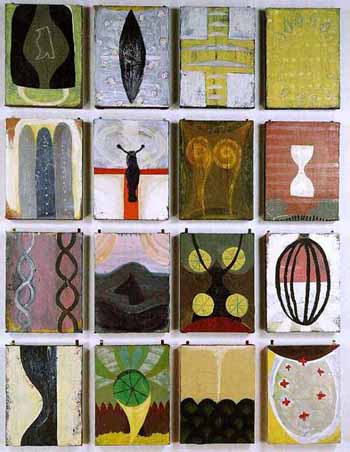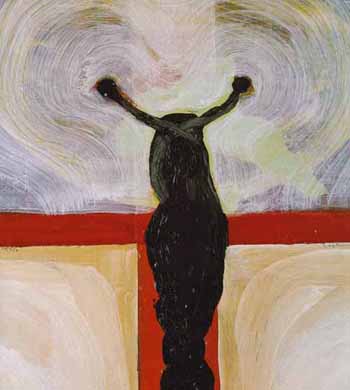Li-young
Lee
THE FATHER'S HOUSE
Here, as in childhood, Brother, no one knows us.
And someone has died, and someone is not yet
born, while our father walks through his church
at night
and sets all the clocks for spring. His
sleeplessness
weighs heavy on my forehead, his death almost
nothing. in the only letter he wrote to us
he says, No one can tell how long it takes
a seed
to declare what death and lightning told it
while it slept. But stand at a window
long enough,
late enough, and you may some night hear
a secret you'll tomorrow, parallel to the morning,
tell on a wide, white bed, to a woman
like a sown ledge of wheat. Oryou may
never
tell it, who lean across the night and miles
of the sea,
to arrive at a seed, in whose lamplit house
resides a thorn, or a wee man, carving
a name on a stone, at afluctuating table of
water,
the name of the one who has died, the name
of the one
not born unknown. Someone has died.
Someone
is not yet born. And during this black
interval, |

It's from Transforming Vision:
Writers on Art,
selected by Edward Hirsch
(Boston: Bullfinch-Little Brown,
1994) |
I sweep all three floors of our father's house,
and I don't count the broom strokes; I row
up and down for nothing but love: his for me,
and my own
for the threshold, as well as for the woman's
name
I hear while I sweep, as though she swept
beside me, a woman who, if she owns a face at
all,
it is its own changing; and if I know her name
I know to say it so softly she need not
stop her work to hear me. But when she lies
down
at night, in the room of our arrival, she'll
know
I called her, though she won't answer, who is
on her way
to sleep, until morning, which even now,
is overwhelming, the woman combing her hair opposite
the direction of my departure.
And only now and then do I lean at a jamb
to see'if I can see what I thought I heard.
I heard her ask, My love, why can't you sleep?
and answer, Someone has died, and someone
is not yet born. Meanwhile, I hear
the voices
of women telling a story in the round,
so I sit down on a rain-eaten stoop, by the saltgrasses,
and go on folding the laundry I was folding,
the everyday clothes of our everyday life, the
death
clothes wearing us clean to the bone, to the
very
ilium crest, where my right hand, this hand, half
crab, part bird, has often come to rest on her,
whose name I know. And because I sat down,
I hear their folding sound, and know
the tide is rising early, and I can't hope
to trap their story told in the round.
But the woman
whose name I know says, Sleep, so I lie
down
on the clothes, the folded and unfolded, the
life
and the death. Ages go by When I wake, the
story
has changed the firmament into domain, domain
into a house. And the sun speaks the day,
unnaming, showing the story, dissipating the
boundaries
of the telling, to include the one who has died
and the one not yet born. Someone has died
and someone is not yet born. How still
this morning grows about the voice of one
child reading to another, how much a house
is house at all due to one room where an elder
child reads to his brother, and that younger
knows by heart the brother-voice. How darker
other rooms stand, how slow morning comes, collected
in a name, told at one sill and listened for
at the threshold of dew What book is this we read
together, Brother, and at which window
of our father's house? In which upper room?
We read it twice: Once in two voices, to each
other; once in unison, to children,
animals, and the sun, our star, that vast office
of love, the one we sit in once, and read
together twice, the third time bosomed in
the future. So birds may lend their church,
sown
in air, realized in the body uttering
windows, growing rafters, couching seeds. |

It's from Transforming Vision:
Writers on Art,
selected by Edward Hirsch
(Boston: Bullfinch-Little Brown,
1994) |
EATING ALONE
I've pulled the last of the year's young onions.
The garden is bare now. The ground is cold,
brown and old. What is left of the day
flames
in the maples at the corner of my
eye. I turn, a cardinal vanishes.
By the cellar door, I wash the onions,
then drink from the icy metal spigot.
Once, years back, I walked beside my father
among the windfall pears. I can't recall
our words. We may have strolled in silence.
But
I still see him bend that way-left hand braced
on knee, creaky-to lift and hold to my
eye a rotten pear. In it, a hornet
spun crazily, glazed in slow, glistening juice.
It was my father I saw this morning
waving to me from the trees. I almost
called to him, until I came close enough
to see the shovel, leaning where I had
left it, in the flickering, deep green shade.
White rice steaming, almost done. Sweet
green peas
fried in onions. Shrimp braised in sesame
oil and garlic. And my own loneliness.
What more could 1, a young man, want.
I ASK MY MOTHER TO SING
She begins, and my grandmother joins her.
Mother and daughter sing like young girls.
If my father were alive, he would play
his accordion and sway like a boat.
I've never been in Peking, or the Summer Palace,
nor stood on the great Stone Boat to watch
the rain begin on Kuen Ming Lake, the picnickers
running away in the grass.
But I love to hear it sung;
how the waterlilies fill with rain until
they overturn, spilling water into water,
then rock back, and fill with more,
Both women have begun to cry.
But neither stops her song.
VISIONS AND INTERPRETATIONS
Because this graveyard is a hill,
I must climb up to see my dead,
stopping once midway to rest
beside this tree.
It was here, between the anticipation
of exhaustion, and exhaustion,
between vale and peak,
my father came down to me
and we climbed arm in arm to the top.
He cradled the bouquet I'd brought,
and 1, a good son, never mentioned his grave,
erect like a door behind him.
And it was here, one summer day, I sat down
to read an old book. When I looked up
from the noon-lit page, I saw a vision
of a world about to come, and a world about to
go.
Truth is, I've not seen my father
since he died, and, no, the dead
do not walk arm in arm with me.
If I carry flowers to them, I do so without their
help,
the blossoms not always bright, torch-like,
but often heavy as sodden newspaper.
Truth is, I came here with my son one day,
and we rested against this tree,
and I fell asleep, and dreamed
a dream which, upon my boy waking me, I told.
Neither of us understood.
Then we went up.
Even this is not accurate.
Let me begin again:
Between two griefs, a tree.
Between my hands, white chrysanthemums, yellow
chrysanthemums.
The old book I finished reading
I've since read again and again.
And what was far grows near,
and what is near grows more dear,
and all of my visions and interpretations
depend on what I see,
and between my eyes is always
the rain, the migrant rain.
For a New Citizen of These United States
Forgive me for thinking I saw
the irregular postage stamp of death;
a black moth the size of my left
thumbnail is all I've trapped in the damask.
There is no need for alarm. And
there is no need for sadness, if
the rain at the window now reminds you
of nothing; not even of that
parlor, long like a nave, where cloud-shadow,
wing-shadow, where father-shadow
continually confused the light. In flight,
leaf-throng and, later, soldiers and
flags deepened those windows to submarine.
But you don't remember, I know,
so I won't mention that house where Chung hid,
Lin wizened, you languished, and Ming-
Ming hush-hushed us with small song. And
since you
don't recall the missionary
bells chiming the hour, or those words whose
sounds
alone exhaust the heart-garden,
heaven, amen-I'll mention none of it.
After all, it was just our life,
merely years in a book of years. It was
1960, and we stood with
the other families on a crowded
railroad platform. The trains came, then
the rains, and then we got separated.
And in the interval between
familiar faces, events occurred, which
one of us faithfully pencilled
in a day-book bound by a rubber band.
But birds, as you say, fly forward.
So I won't show you letters and the shawl
I've so meaninglessly preserved.
And I won't hum along, if you don't, when
our mothers sing Nights in Shanghai.
I won't, each Spring, each time I smell lilac,
recall my mother, patiently
stitching money inside my coat lining,
if you don't remember your mother
preparing for your own escape.
After all, it was only our
life, our life and its forgetting.
***The poems are from Lee's book
Rose (Brockport, NY: Boa, 1986); poem number 9 is from The City
in Which I Love You; poem is
from Transforming Vision: Writers on Art, selected by Edward Hirsch
(Boston: Bullfinch-Little Brown, 1994).
***The background is a print
called "Sacrament and Sorrow" done by Li-young Lee's brother Li Lin Lee.
It's from Crown
Point Press.
SACRAMENT AND SORROW, 1989/Color woocut on silk mounted on rag paper/23
x 21-1/2", edition 25
back to ¡@¡@ ¡@¡@
¡@¡@ ¡@¡@
¡@¡@ ¡@Li-young
Lee
¡@Li-young
Lee



